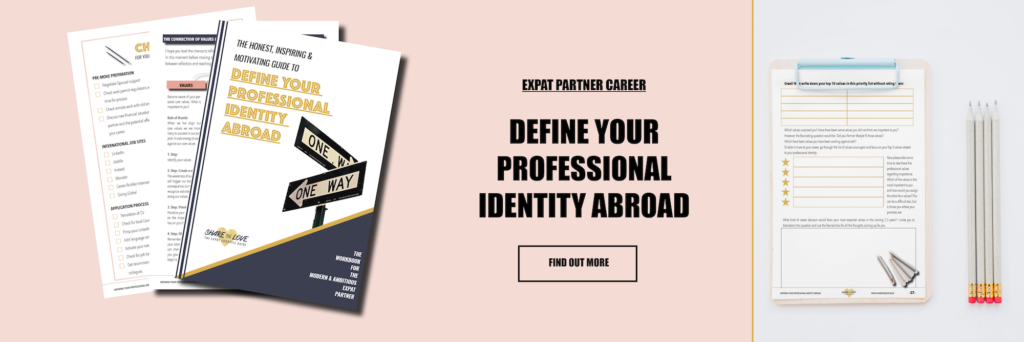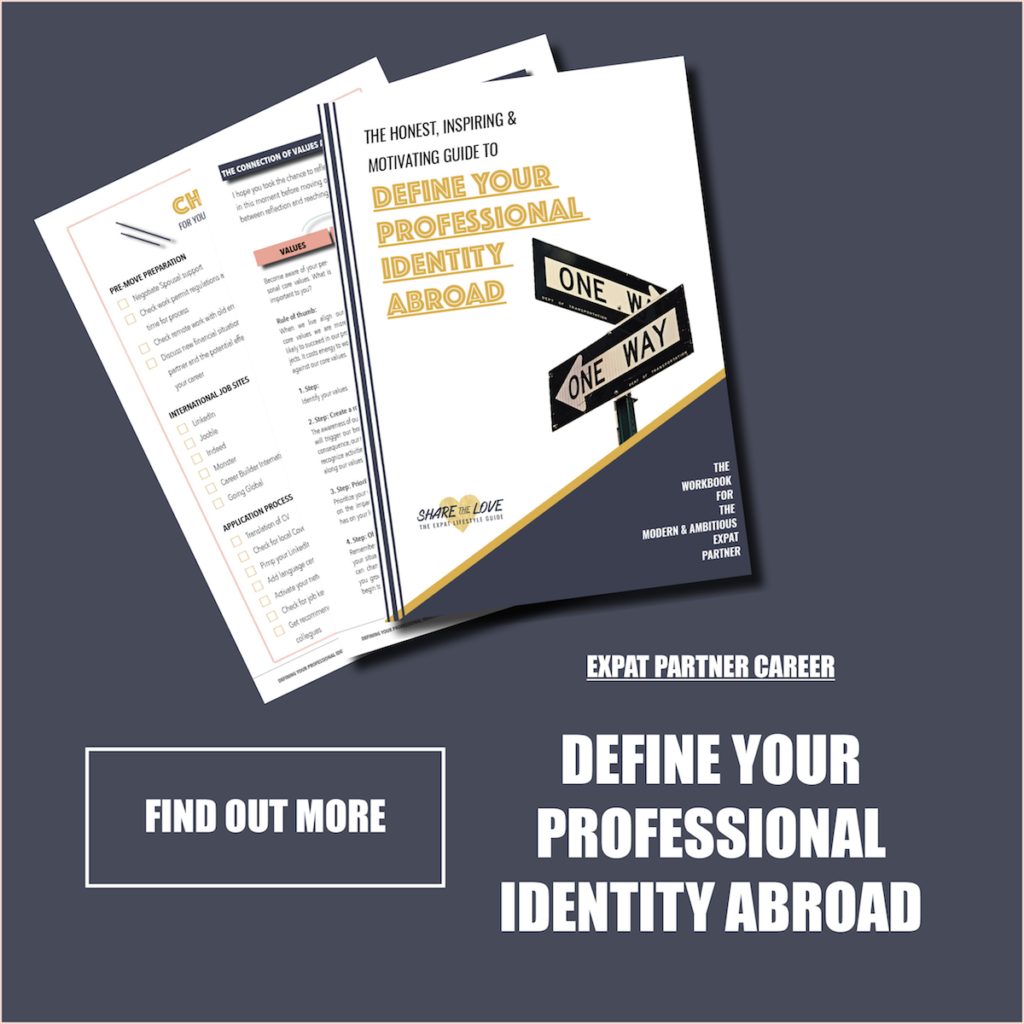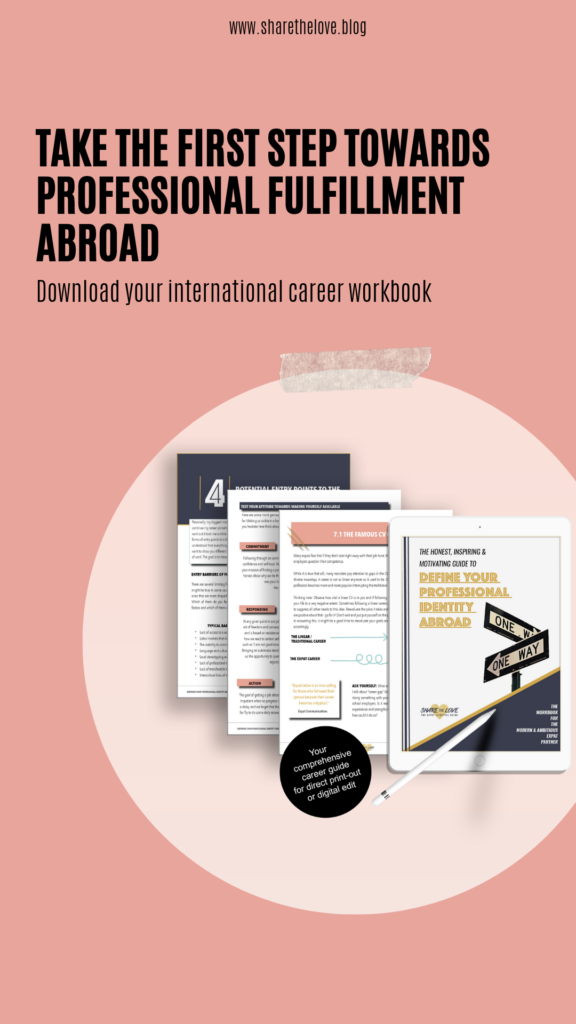
POTENTIAL ENTRY POINTS TO THE FOREIGN JOB MARKET
WE ALL HAVE UNIQUE ENTRY BARRIERS
FULL-TIME TRANSFER OF FORMER CAREER
POTENTIAL STARTING POINTS BESIDES THE OPEN JOB MARKET
This is the most obvious approach most Expat Partners have in mind when going abroad. Most of the time this means to actually continue with the known work life from back home but with a different cultural surrounding.
POTENTIAL STARTING POINTS
- International companies
- Companies searching for employees with your native language
- Working at your partner's employer
BECOMING SELF-EMPLOYED AND TURNING A HOBBY/VISION INTO A PROFESSION
For some Expat Partners, a corporate career does not offer enough flexibility regarding mobility or family life. If this is not the only expat destination for you, it might make sense to think about a portable career for yourself. Something you can take with you when there will be a next move around the corner.
POTENTIAL STARTING POINTS
- Starting your own online business with a portable factor
- Starting your own offline business during the limited time abroad
Want some good vibes in your mail?
TEACHING AT AN INTERNATIONAL SCHOOL
If you are fluent in English, teaching at an international school can be a great option to be flexible but earning money at the same time. There are over 6,600 international schools worldwide, and the number is rising. Nowadays, these schools also attract locals due to their excellent reputation for having a high learning standard, and there is more demand for teachers with a background in English than ever before. It’s also a great job to take with you in case serial expatriation is a topic. Short-term contracts are quite standard and offer flexibility for both sides. The downside: Serious certification is needed to teach at international schools. If you are not an English native speaker, language schools which focus on the non-native speaker are also an option. These schools usually accept the TEFL test as certification.
POTENTIAL STARTING POINTS
- Starting your own online business with a portable factor
- Starting your own offline business during the limited time abroad
VOLUNTEERING
Many Expats end up volunteering when other options have not been successful. However, my experience shows that volunteering has by far a worse reputation than it should be. Instead of seeing it as something which always seems possible you should rather see it as a valid entry ticket to a foreign job market and a real cultural training court.
POTENTIAL STARTING POINTS
- Approach volunteering from a conscious perspective: What topic are you interested in? Where is your passion? Children, Pets, local issues, environment, etc.
- Connect volunteering with training a skill that is valuable to you
INTERNSHIP
When you reached a certain career level, it might feel strange to think about internships as a valid approach to a foreign job market. However, similar to the volunteering sector this gives you a potential entry ticket when entry barriers are otherwise really high. So think twice before saying “I am too experienced for that”. This might also be the best opportunity to switch career paths! However, please take into consideration that most countries can only hire you for an internship when you are enrolled in an academic degree so there might be a legal barrier you are facing here.
POTENTIAL STARTING POINTS
- Check legal requirements for an internship in your new country
- Research companies you want to get a foot into. Companies that are interesting enough for you to invest in a longer-term approach
- Choose companies which offer you the desired career switch or to learn skills you always wanted to gain, but it was never matching your old career path
FREELANCING
If you don’t want to start a comprehensive business on your own, there are still several options which allow you to work from wherever you are but keep your clients and tasks. Freelancing is super trendy amongst Digital Nomads as this type of profession enables you to live a location independent professional life. A freelancer can legally work in most countries. This means that as long as you don’t serve local clients and operate only virtually, you should not have issues.
POTENTIAL STARTING POINTS
- Travel writer
- Copywriter / Writer for search-optimized texts
- Consultants
- Social Media Managers
- Translator
- App Developer
- Graphic Design
- Web-Site Development
- Online Teaching
- UX Design
- Virtual Assistant
- Coaching
EDUCATIONAL DEVELOPMENT
If work permits are an issue but you want to continue working on your career, going back to university might be the path to follow. A foreign degree can have a profoundly positive impact on your job outlook back home. Many big corporations are open to funding an educational degree abroad for the Expat Partner. Going back to university or train yourself in workshops can be a good idea. If your partner’s company is not offering a huge Expat Package to train yourself, there are still plenty of free or very favorable online courses you can take no matter where you are living now.
POTENTIAL STARTING POINTS
- www.coursera.com
- www.edx.org
- www.skilshare.com
- www.udemy.com
TURNING A HOBBY INTO A WORK PROJECT
Your time abroad can also be very fulfilling beyond the typical work forms. It can be the best time to realize an idea or skill that is not yet a straightforward business idea but can develop itself towards it.
POTENTIAL STARTING POINTS
- Writing the book, you always wanted to write
- Start a blog and monetize it
- Improve your photography skills and sell your images
- Enter the crafting industry if you have a knack for it
- Learn the language and dive deeper into the local culture
- Develop an interest in health and happiness topics (which often develop into a serious business approach over time)
- Travel! Use your new hub for different vacation than you are used to. Maybe a solotrip from time to time will be something for you


Thanks for sharing the love and stopping by

Share this article with a friend and share the love:
You also might like:

When preparation becomes a form of procrastination
Have you ever asked yourself if you are really taking the right approach to your job search? In this blog post, I’ll address the two most common strategic mistakes I observe as a career coach and invite you on a little journey of reflection.

Create your own Clarity Circle
In this blog post, I will provide you with a great coaching exercise to help you reflecting on your WHY concerning your next professional step. In case you are thinking about re-entering the workforce or switching roles but are not yet fully clear on what this new profession looks like this is a great tool to kick off the thought process.

The big entry ticket: What enables a smooth re-entry?
How do women land a job after a long career break? Is it by sending out traditional CVs to recruiters? I was curious to learn more about it, especially when there is a rather non-linear CV involved. So I interviewed women around the globe and asked them straight away. In this blog post, I am sharing two strategies that worked for many of them. You can also download the full study for free including all 5 essential access strategies. What will be your approach?

The Career Decision Tree Model
In this blog post, I present you with a new career concept about decisive and influencing factors on female careers around the globe. This model called, the career decision tree model, is also a great starting point to reflect on your own career decisions and I will show you how to work with it in this blog post.

The emotional rollercoaster of a career break
A career break is a phase in life that is always associated with self-doubt and uncertainty. Often women make their peace with this time after they have re-entered the labor market and have found for themselves that they have enjoyed the best of both worlds. Only in retrospect are many women very grateful for this time and at peace with their decision. In this blog post, I am sharing the emotional rollercoaster of women around the globe with long career breaks. Read about Lisa, who re-entered the workforce after 7 years and learn from her personal approach.

Why do women decide to leave the 9 to 5
About 62% of the workforce has taken a career break in their professional history at some point (LinkedIn, 2022). While in the past, career breaks have been a huge stigma and often led to career breakers not re-entering the workforce at all, we are experiencing a new era. But why is it that especially female employees, committed to their profession and boosting recognition and acknowledgment, are deciding to take a career break? In this blog post, I am shedding some light on the reasons for taking a career break and its implications.


